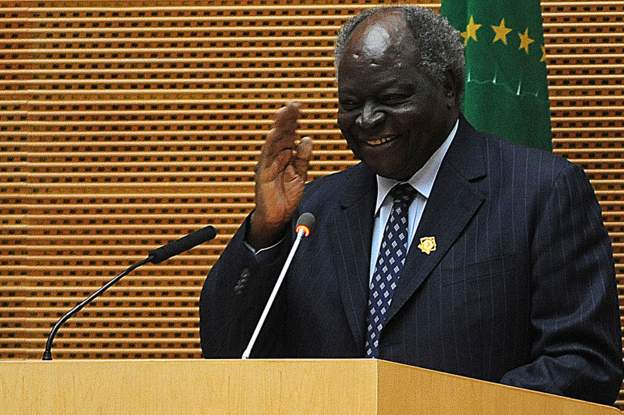Kenya's former president, Mwai Kibaki, has died at the age of 90, President Uhuru Kenyatta has announced.
His 2002 election ended 40 years of one-party rule since independence.
However, his 2007 re-election sparked months of nationwide violence and led to 1,200 deaths.
President Kenyatta, defeated by Mr Kibaki in 2002, led the tribute to his former rival, saying he had "led the charge to keep the ruling party accountable".
Mr Kibaki had "earned the abiding respect and affection" of this nation, the president continued.
Mr Kenyatta declared a mourning period until Mr Kibaki's burial, with flags flying at half-mast. He will be given a state funeral with full military honours, President Kenyatta said.
Many Kenyans are expressing a real sense of loss and regard Mr Kibaki as the best president Kenya has had since independence.
He was a sharp economist who set the country on a path of economic growth. He held a number of senior positions in treasury and government in his political career that spanned decades.
Politically, however, he was regarded as a non-confrontational fence-sitter and opportunist. He opposed the introduction of multiparty democracy but jumped ship after the constitution was amended. He then embraced it, formed his own political party, and, 10 years later, went on to win the election as head of an opposition coalition.
Both traits would be seen during his tenure as president. Kenya recorded one of its highest rates of GDP growth during his first term, before the violence of the 2007 election severely dented his legacy.
As well as his economic record, one of his biggest achievements was to introduce free primary education to Kenya.
Under his watch, Kenya also gained a new constitution, after it was overwhelmingly approved in a national referendum in 2010. It was billed by some at the time as the most important political event in Kenya's history since it gained independence from Britain in 1963.
It introduced a more decentralised political system and limited presidential powers.
His biggest failure was the fight against corruption. He'd promised to fight it, but his government was rocked by major corruption scandals.
But the 2007-2008 election violence after a disputed vote was the worst in the country's history and the lowest point of his presidency. Not only were more than 1,200 lives lost, but more than half a million people were forced from their homes.
During the violence there were hundreds of rapes and more than 100,000 properties were destroyed, according to the International Criminal Court (ICC). It charged leading politicians with orchestrating the violence but neither Mr Kibaki nor opposition leader Raila Odinga was among them.
The electoral commission, under tight police security, declared Mr Kibaki the winner of the vote, although Mr Odinga alleged widespread fraud. President Kibaki was sworn in hurriedly for the second term as the country descended into violence.
An investigation led by former South African judge Johann Krieglar determined that both sides had participated in electoral malpractices in different regions which made it impossible to determine who had won that election.
The violence was eventually ended in a power-sharing deal brokered by former UN secretary-general Kofi Annan, which saw Mr Odinga become prime minister.
Mr Odinga has joined those mourning the death of his former rival, describing it as "a very sad occasion for the nation" and saying Mr Kibacki had "served this country for many years with diligence, with fortitude, with honesty and transparency".
He is survived by four children.
Latest Stories
-
Expansion Drive: Takoradi Technical University increases faculties
12 minutes -
SHS heads demand payment of outstanding funds before reopening of schools
48 minutes -
We thank God for the 2024 general elections – Akufo-Addo
1 hour -
Coconut Grove Beach Resort marks 30 years of excellence with memorable 9 lessons & carols service
1 hour -
WAFU B U-17 Girls’ Cup: Black Maidens beat Nigeria on penalties to win inaugral tournament
2 hours -
Real Madrid beat Sevilla to keep pressure on leaders Atletico
3 hours -
Liverpool put six past Spurs to go four points clear
3 hours -
Manchester United lose 3-0 at home to Bournemouth yet again
3 hours -
CHAN 2024Q: ‘It’s still an open game’ – Didi on Ghana’s draw with Nigeria
3 hours -
CHAN 2024Q: Ghana’s Black Galaxies held by Nigeria in first-leg tie
4 hours -
Dr Nduom hopeful defunct GN bank will be restored under Mahama administration
5 hours -
Bridget Bonnie celebrates NDC Victory, champions hope for women and youth
5 hours -
Shamima Muslim urges youth to lead Ghana’s renewal at 18Plus4NDC anniversary
6 hours -
Akufo-Addo condemns post-election violence, blames NDC
6 hours -
DAMC, Free Food Company, to distribute 10,000 packs of food to street kids
7 hours

